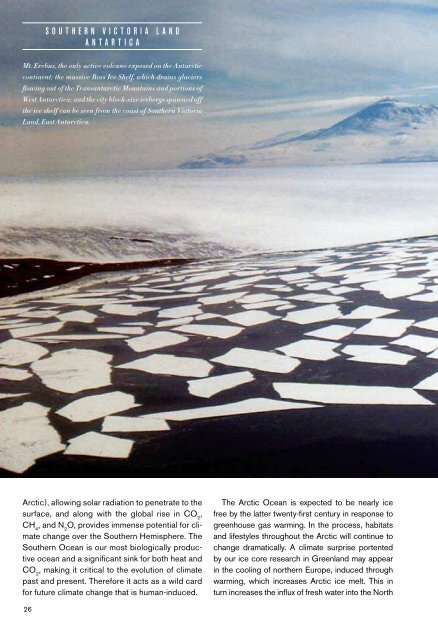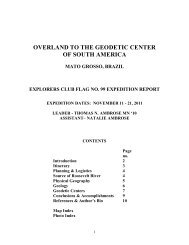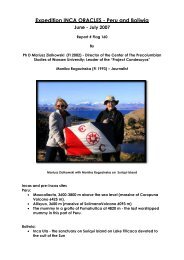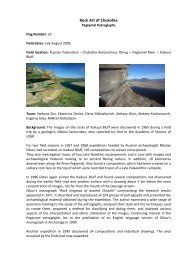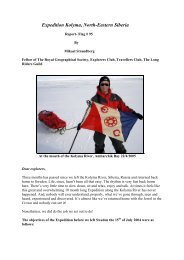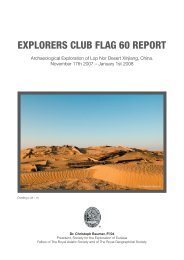the explorers journal the climate change issue - The Explorers Club
the explorers journal the climate change issue - The Explorers Club
the explorers journal the climate change issue - The Explorers Club
You also want an ePaper? Increase the reach of your titles
YUMPU automatically turns print PDFs into web optimized ePapers that Google loves.
sou<strong>the</strong>rn victoria land<br />
antartica<br />
Mt. Erebus, <strong>the</strong> only active volcano exposed on <strong>the</strong> Antarctic<br />
continent; <strong>the</strong> massive Ross Ice Shelf, which drains glaciers<br />
flowing out of <strong>the</strong> Transantarctic Mountains and portions of<br />
West Antarctica; and <strong>the</strong> city block-size icebergs spawned off<br />
<strong>the</strong> ice shelf can be seen from <strong>the</strong> coast of Sou<strong>the</strong>rn Victoria<br />
Land, East Antarctica.<br />
Arctic), allowing solar radiation to penetrate to <strong>the</strong><br />
surface, and along with <strong>the</strong> global rise in CO 2<br />
,<br />
CH 4<br />
, and N 2<br />
O, provides immense potential for <strong>climate</strong><br />
<strong>change</strong> over <strong>the</strong> Sou<strong>the</strong>rn Hemisphere. <strong>The</strong><br />
Sou<strong>the</strong>rn Ocean is our most biologically productive<br />
ocean and a significant sink for both heat and<br />
CO 2<br />
, making it critical to <strong>the</strong> evolution of <strong>climate</strong><br />
past and present. <strong>The</strong>refore it acts as a wild card<br />
for future <strong>climate</strong> <strong>change</strong> that is human-induced.<br />
<strong>The</strong> Arctic Ocean is expected to be nearly ice<br />
free by <strong>the</strong> latter twenty-first century in response to<br />
greenhouse gas warming. In <strong>the</strong> process, habitats<br />
and lifestyles throughout <strong>the</strong> Arctic will continue to<br />
<strong>change</strong> dramatically. A <strong>climate</strong> surprise portented<br />
by our ice core research in Greenland may appear<br />
in <strong>the</strong> cooling of nor<strong>the</strong>rn Europe, induced through<br />
warming, which increases Arctic ice melt. This in<br />
turn increases <strong>the</strong> influx of fresh water into <strong>the</strong> North<br />
Atlantic. <strong>The</strong> salinity decrease as a consequence<br />
of <strong>the</strong> freshening in <strong>the</strong> Arctic may be sufficient to<br />
reduce <strong>the</strong> density of North Atlantic surface water,<br />
leading to a reduction in deepwater production and,<br />
as a consequence, reduced heat transport to nor<strong>the</strong>rn<br />
Europe. In addition, <strong>change</strong>s in precipitation<br />
and atmospheric circulation are evolving over <strong>the</strong><br />
Nor<strong>the</strong>rn Hemisphere as a result of warming over<br />
<strong>the</strong> Arctic and lower latitudes.<br />
Temperatures of <strong>the</strong> last few decades are <strong>the</strong><br />
highest recorded in <strong>the</strong> instrumental era—<strong>the</strong><br />
last 100 years—and through examination of temperature<br />
reconstructions utilizing ice core, tree<br />
ring, historical, and o<strong>the</strong>r data series, it is clear<br />
that Nor<strong>the</strong>rn Hemisphere temperatures are <strong>the</strong><br />
highest of at least <strong>the</strong> last millennium. This finding,<br />
repeated by several investigators and validated by<br />
numerous reviews of <strong>the</strong> data, is a consequence<br />
26 <strong>the</strong> <strong>explorers</strong> <strong>journal</strong>


